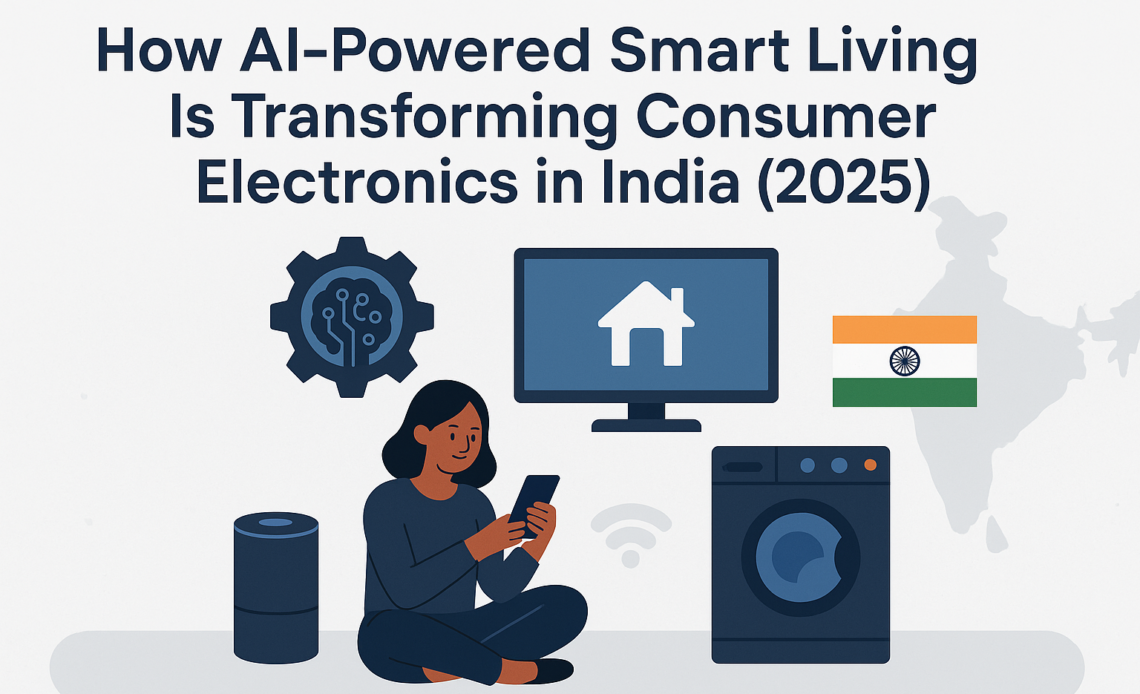
Walk into any modern Indian home in 2025, and you’ll find a living space that looks dramatically different from just five years ago. Where once a simple television stood, now an AI-powered entertainment hub personalizes viewing experiences. Air conditioners no longer rely on preset timers but intelligently learn daily routines, adjusting temperatures proactively before anyone reaches for the remote.
This transformation goes far beyond basic automation. Artificial Intelligence is seamlessly integrating into daily life — understanding context, learning preferences, and quietly enhancing comfort, convenience, and productivity. In India, the Smart Home market is expected to reach a value of USD 7.3 billion in 2025, reflecting how deeply AI has permeated consumer lifestyles.
The AI Revolution Takes Root in India
India’s consumer technology sector is witnessing a fundamental shift. Rajeev Singh, Managing Director at BenQ India and South Asia, perfectly captures this evolution:
“India’s consumer tech landscape is undergoing a true AI transformation, moving beyond basic automation to intelligent systems that genuinely understand context and adapt to individual needs.”
Indian consumers — especially in Tier 2 and Tier 3 cities — are embracing smart technologies at an unprecedented pace. The appeal lies in efficiency, long-term savings, and enhanced productivity, making AI-powered solutions not just desirable but increasingly essential.
AI Transforms Home Entertainment
Visual entertainment has been one of the biggest beneficiaries of AI integration. BenQ’s purposeful use of AI in its projectors and monitors demonstrates this shift:
“Our W2720i and W4100i projectors use AI-powered cinema modes that automatically adjust to ambient lighting and content. Similarly, our MOBIUZ gaming monitors intelligently enhance visual details, ensuring a seamless and immersive experience,” explains Singh.
AI works silently in the background — learning user preferences, fine-tuning display settings, and delivering optimal performance without the need for constant manual adjustment. It’s not about replacing human creativity but enhancing it.
Similarly, Hisense India shares this vision. Pankaj Rana, CEO of Hisense India, remarks:
“AI is no longer just a feature; it’s shaping how we live, interact, and make decisions every day. Our Hi-View Engine and Toshiba’s Regza Engine ZRi optimize picture and sound automatically, while features like AI Energy and AI Scenario adapt to user routines effortlessly.”
Hisense’s philosophy revolves around creating smart products that fit naturally into people’s lifestyles, simplifying daily living without overwhelming users with unnecessary complexity.
Making Smart Living Accessible to All
While many associate smart homes with luxury, companies like Cellecor Gadgets are democratizing smart living for the masses. Ravi Agarwal, Founder and Managing Director of Cellecor Gadgets Limited, emphasizes:
“Smart living should be simple, intuitive, and accessible to every Indian household. We design products that resonate with consumers across all tiers — from Tier 1 cities to Tier 3 towns.”
Cellecor’s AI-powered smart TVs feature voice assistance, screen mirroring, and integrated apps, providing a rich and personalized entertainment experience. Their smartwatches offer practical features such as Bluetooth calling, fitness tracking, and real-time notifications — blending functionality with affordability.
“We’re not just creating devices; we’re building experiences that align with how people live, work, and unwind,” adds Agarwal.
Wearables Evolve Into Intelligent Companions
AI is also transforming wearables from simple tracking devices into proactive lifestyle companions. CP Khandelwal, CEO of PR Innovations and Brand Custodian for Amazfit India, explains:
“AI is becoming the foundation of how consumers interact with technology. Our smartwatches are evolving with features like offline maps, adaptive battery optimization, and advanced health monitoring.”
These AI-powered wearables offer real-time health insights, stress tracking, and personalized recommendations, making them indispensable tools for modern, connected living.
The Future of AI-Powered Smart Living
At CES 2025, the world witnessed groundbreaking AI innovations — from generative AI content creation to personalized robotics and next-gen wearables. India, with its rapidly growing tech-savvy population, is uniquely positioned to embrace these advancements.
As AI continues to evolve, the focus remains clear: simplicity, personalization, and real-life problem solving. The goal is not to complicate life but to make technology an invisible, adaptive assistant that enhances everyday living.
With the smart living market projected to grow at an impressive 9% annually through 2030, AI-powered devices are set to become a natural part of Indian households — not as a luxury, but as a new standard of convenience and comfort.
In 2025 and beyond, AI-powered smart living isn’t just redefining the consumer electronics experience — it’s reshaping how we live

